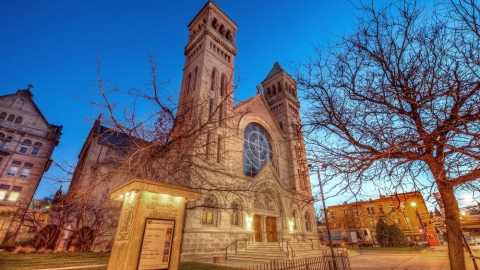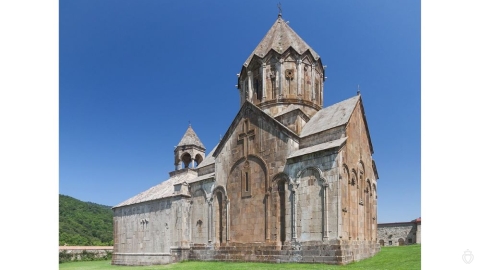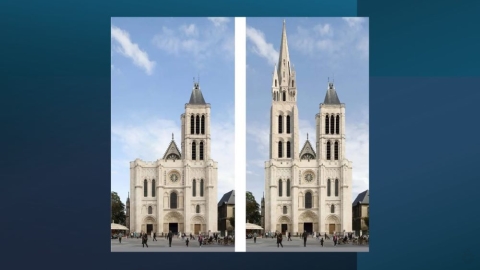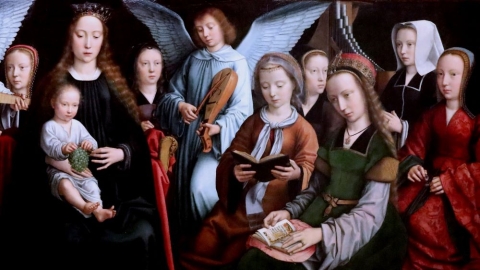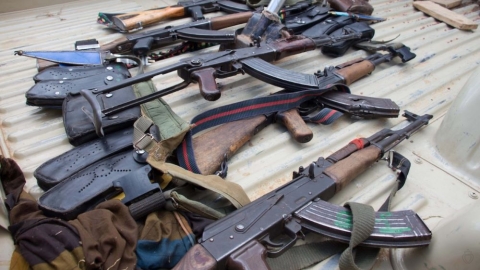Germany: Second Day of the Fifth Synodal Path Assembly
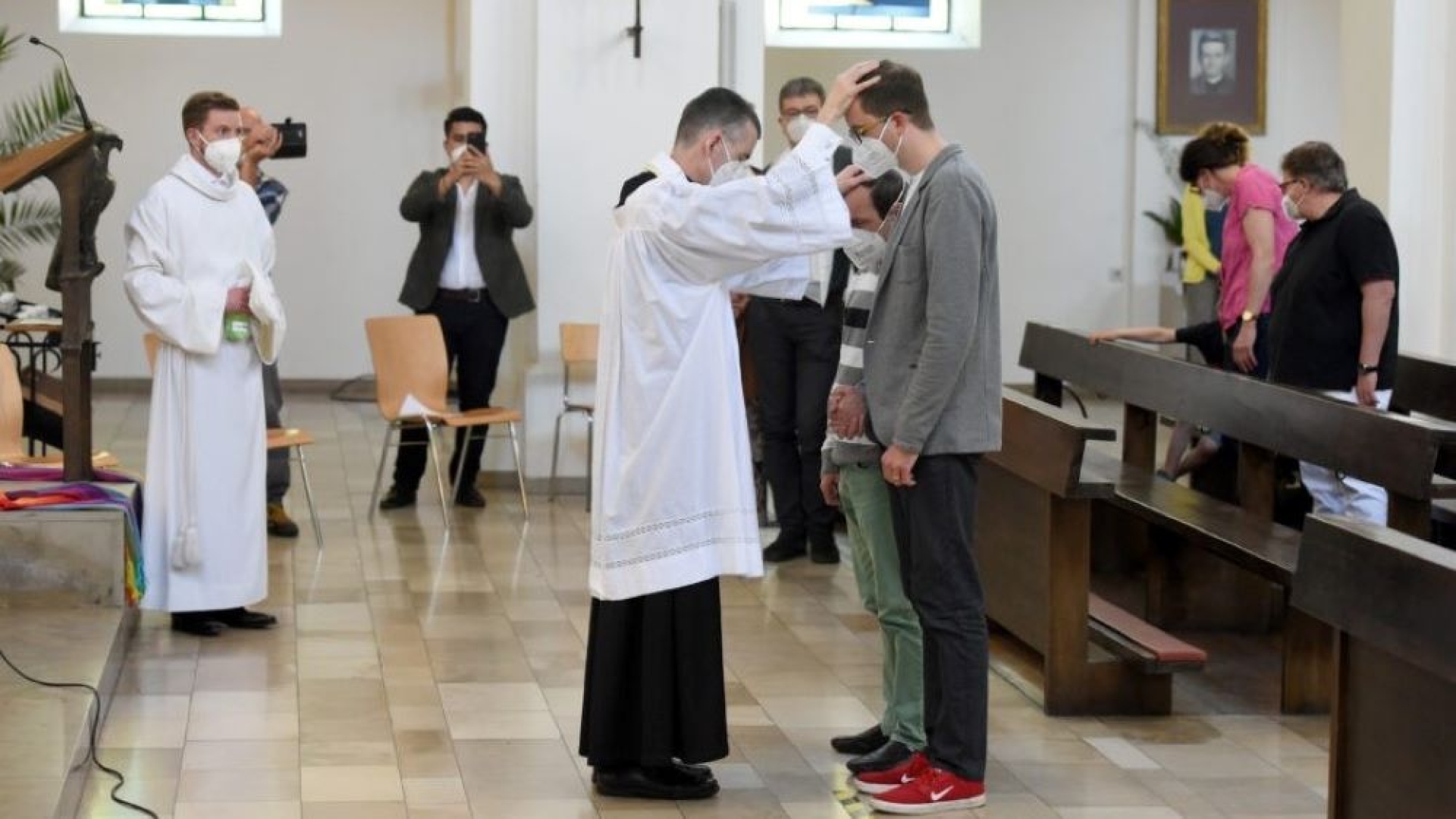
Blessing of a homosexual couple by a German priest on May 10, 2021
On Friday March 11, the second day of the 5th and final Assembly of the German Synodal Path took place. The agenda promised to be difficult, in particular because of the “last minute” presentation of amendments by the bishops, with an undisguised threat not to vote for certain texts as they were presented.
This situation was rather badly received by the laity and the Central Committee of German Catholics (ZdK), but everyone was aware that a new refusal of the text – as had happened at the previous Assembly –would practically signify the end of the debates.
Preaching, Baptism, Marriage, and Parish Management
After exchanges from all directions, the text was approved by about a 90% majority, but as some lay people complained, it was strongly watered down. Following the bishops’ amendment, accepted by the Synodal Assembly, the text the “Proclamation of the Gospel by the Laity in Word and Sacrament” requires action by the German bishops on the following three points:
An authorization in principle concerning “the introduction of the extraordinary administration of baptism according to Can. 230 §3 CIC 1983”; then, “the assistance at the marriage of the laity according to Can. 1112 CIC 1983”; and finally “a commission of lay women to assist in the management of parishes in accordance with the legal requirements of Can. 517 §2 and Can. 517 §2 CIC 1983.”
The pastoral commission of the German Bishops' Conference (DBK) will coordinate a “consultation process” and consider “how existing ministries and offices should be developed and what new ministries and offices should be designed so that the Church can and should respond to new challenges.”
The Bishops' Amendments
The bishops removed the possibility “of reviving lay confession in the context of spiritual accompaniment.” The same goes for the sacrament of extreme unction: “the importance of the blessing and the anointing of the sick will also be considered with regard to all the pastoral agents working in the accompaniment of the sick,” was also deleted.
The reflections of a Franciscan superior on these suppressions are rather sentimental. In particular: “We stayed well below what we wanted to achieve. … In fact, we want the free market of the Church.… Secular confession already existed in the Middle Ages … but in the end we always need a priest to administer the sacrament.”
Finally, the threat: “If nothing decisive changes in the official way in the foreseeable future, something will change in us and in other communities,” i.e., we will confess among ourselves...
It should be noted that it is pure fantasy to speak of secular confession, the only thing that existed in the Middle Ages was, in the event of danger of death, in the impossibility of having a priest - for example during the crusades – to reveal one's sins to a layman, to stir up contrition. But there was never absolution in these circumstances.
The Text on Synodal Councils
Faced with the clear opposition of being blocked by a minority of bishops, the Synodal Assembly decided not to approve the second reading of the text “Consult and decide together” on the introduction of synodal councils in the dioceses and parishes, leaving this task to the Synodal Committee. But this is case of stepping back so as to make a better jump, because it is the Committee that will normally be the group to establish these councils.
There were indeed bishops who opposed the text, who should have formed a blocking minority, but only 9 out of 20 had the courage to vote against it, the other eleven abstained, but abstention according to the rule is not counted. The latter therefore have to take some responsibility for the text being approved.
As a reminder, a document is only approved if two-thirds of the Assembly on the one hand, and two-thirds of the bishops on the other hand, vote in favor. However, there were 58 bishops eligible to vote. The 20 opponents could therefore have swung the vote.
The text affirms that the Church “offers recognition and accompaniment to couples who are united in love, meet in full respect and dignity, and are ready to live their sexuality for the long-term with respect for themselves, of others and with social responsibility.”
It is therefore recommended that the DBK and the ZdK “develop and introduce in due course appropriate liturgical celebrations.” A brochure would include “proposed forms for blessing celebrations for different couple situations (remarried couples, same-sex couples, couples after a civil marriage).”
While there is “no obligation imposed on anyone to perform such celebrations,” conversely, no bishop can impose disciplinary sanctions on a priest who does perform them. In fact, such blessings have already taken place in all the German dioceses without any consequences for priests. Blessing ceremonies will be officially introduced in March 2026.
Despite certain precautions to prevent these blessings from being equivalent to a marriage, it is obvious that their meaning, for the couples concerned, will be like a recognition by the Church of their state and will leave them in the certainty that they are not outside the law of God. And it is not difficult to predict that the blessing will soon turn into “marriage.”
Cardinal Pietro Parolin, Secretary of State of the Vatican, questioned on this subject, recalled that the Holy See is “very clearly” opposed to any blessing of homosexual couples, and added that “a local Church, particularly, cannot make such a decision which involves the discipline of the universal Church.” He should meet with the German bishops.
But will he be supported by Pope Francis? During the ad limina visit of the Belgian bishops at the end of 2022, when they had just set up such a blessing in the Dutch-speaking areas of Belgium, Francis told them: “It is your decision. I can understand it.”
(Source : katholisch.de/InfoCatolica/cath.ch – FSSPX.Actualités)
Illustration : catpure d’écran Twitter
